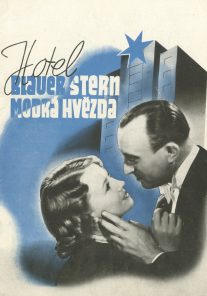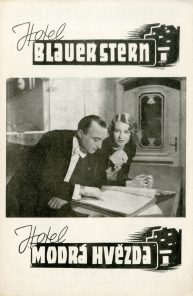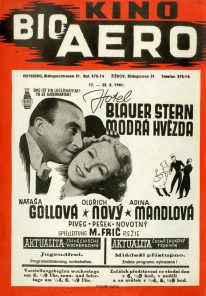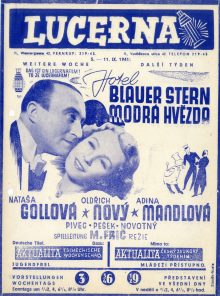Although the number of films produced in Czechoslovakia decreased significantly during the Protectorate, the number of people seeking distraction in cinemas increased considerably. Popular were adaptations of classic Czech literary works, sentimental stories, costume dramas and star-studded social comedies offering a break from the problems related to the ongoing war. The most successful films were often made by Martin Frič, whose name was a guarantee of high-quality filmmaking and excellent direction.
In September 1939, Frič’s Kristian with Oldřich Nový and Nataša Gollová was a resounding success. For Kristian and School is the Foundation of Life (Škola základ života, 1939), Frič received the National Award. He bet on the chemistry and increasing popularity of both actors again in Eva Fools Around (Eva tropí hlouposti, 1939). A few years later, one of the busiest Protectorate directors cast the star couple in another comedy which is reprised to this day.
The Blue Star Hotel (Hotel modrá hvězda, 1941) or Hotel Blauer Stern, in German, can be perceived as a second adaptation of a story by Marie Svobodová or a remake of German comedy The Amorous Hotel (Das verliebte Hotel, 1933) with Anny Ondráková.
The 1933 film was made by Karel Lamač, whom Frič admired and to whom he owed his film career to a certain extent. Václav Wasserman, Lamač’s frequent collaborator, worked alongside Frič while adapting the original story for the purposes of the new film (the script was also co-written by Fany Vavřincová (uncredited), who also wrote Eva Fools Around).
The plot is the same in both cases. An impoverished young woman finds out she has inherited a hotel. She incorrectly assumes that it’s a premium asset in the city centre. But in fact it’s a rather shabby hotel of the same name on the city outskirts. The assiduous and ambitious hero eventually manages to save the decaying hotel and win the heart of a wealthy gentleman who leaves his lavish fiancée because of her.
The film combining elements of conversational comedies, sentimental romances and American slapstick appealed to the audiences with a plot filled with various comedic confusions and misunderstandings and a star-studded cast. Leading actors Nataša Gollová and Oldřich Nový are complemented by many other big names: Adina Mandlová, Theodor Pištěk, Ladislav Pešek, Jan Pivec, Ferenc Futurista and František Filipovský.
First Republic comedies often, more or less organically, included several songs. It was assumed that the audiences would want to listen to these songs at home. For this purpose, the songs were released on vinyl. This trend continued during the Protectorate. A song titled Slunečnice (Sunflower) written by Josef Gruss and performed by Inka Zemánková became a hit.
The film was first screened at the end of July at the second and final edition of the Film Harvest Zlín. At the festival, Nataša Gollová won the National Award for her performance in The Blue Star Hotel and three other films (May Fairy Tale [Pohádka Máje, 1940], Sweet Person [Roztomilý člověk, 1941) and The Glove [Rukavička, 1941]). Reception of the period press was generally favourable and enthusiastic (“the funniest and wittiest film of recent times”)[1]. The reviewers focused mainly on Martin Frič’s directing skills (“made […] effectively but also wittily and with heart”)[2] and the performance of Oldřich Nový who, according to Bedřich Rádl, once again shined thanks to his “comedic brilliance and refined humour using halftones in diction and facial expressions”.[3]
Martin Frič continued making social and historical comedies and occasional dramas until the end of the German occupation. In total, he managed to complete eighteen titles. But only a few of them are as popular as The Blue Star Hotel, as evidenced by its recent digital restoration completed in 2021 with the help of the National Film Archive and the Karlovy Vary IFF in the Universal Production Partners and Soundsquare Studios in Prague.
Martin Šrajer
Notes:
[1] Hotel Modrá hvězda. Filmová kartotéka, no. 35, 1941, p. 1.
[2] ibid.
[3] Bedřich Rádl, Hotel Modrá hvězda. Kinorevue, y. VIII., no. 1 (20th August), 1941, p. 5.




